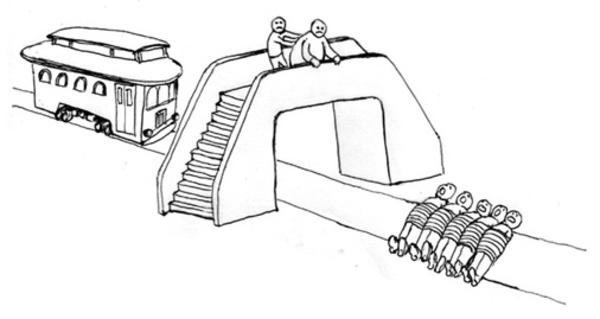
A trolley is about to run into and kill five innocent people. The only way to save them is to push a fat man off a bridge and onto the track, stopping the trolley but killing the fat man in the process. Is it morally good to push the fat man and stop the trolley, killing one to save five?
Buy YES if you think one should push the fat man. Buy NO if you think one should not push the fat man. Market resolves to probability at closing on December 31, 2025.

See also: /AmmonLam/trolley-problem-classic
First of all, this is a "Market resolves to probability at closing" market, therefore you should push it to 50%, to minimize gains for the whale who will bet 1000M in the last 3 seconds
There are some important elements in this scenario which are disanalogous from the standard trolley problem setup. First of all, the fat man will know whether or not you push him, whereas in a standard trolley problem, it is often ambiguous as to whether or not the person on the alternate track knows that you have changed the train's course. Additionally, the fat man might experience pain or discomfort from the fall, which is not mirrored in the standard trolley problem.
If you really want the two scenarios to be analogous, you need to stipulate that the fat man will not know that you pushed him and that he will not experience any negative sensations from the fall.
The fundamental problem with this formulation of the trolley problem is the lack of knowledge. In reality you couldn't know that the trolley wouldn't stop on its own or that the innocent people would roll off the track (or that some other better solution might be available) and you can't know that attempting to push the fat man will stop the trolley. The trolley problem assumes that you know these things, but in any remotely similar situation in the real world you would not know these things. At best this is a useless mind puzzle, but at worst it encourages behaviors in the real world which would be reprehensible.
@DanielParker It's not meant to be realistic. Assuming away those uncertainties is useful for isolating your intuitions and stress-testing your moral views. Then you can build on this improved understanding of your deeper moral values when considering what to do in cases where practical messiness is involved.
@WinstonOswaldDrummond You're right; I'll admit that this kind of hypothetical does have some value. But it is also necessary to understand the places where such a hypothetical is unrealistic so that you can avoid applying the moral values directly to practical applications without accounting for the messiness of reality.
If I were to take the hypothetical seriously, I would consider right answer to clearly be "push the fat man" (followed closely by "plead guilty to first degree murder"). But only because it's a hypothetical where the outcomes are 100% determined. In real life, it is extremely rare to run into situations where you have an opportunity to do something you consider to be evil with the goal of causing some greater good to occur (and never with a certain knowledge that the outcome you desire will occur). It is possible for good can be accomplished by doing something that would otherwise be bad, but even in the rare cases where someone genuinely thinks that the ends justify the means, it is even rarer that the greater good that they were hoping for actually manifests. The wisest strategy is almost always to attempt to accomplish worthy goals by sticking exclusively to legitimate means; the evidence would need to be extraordinary to justify any deviation from that path.
@WinstonOswaldDrummond I would also say that, even as a hypothetical, this version of the Trolley Problem is definitely different from the original one where you pull a lever. Even if you consider the deaths to be equivalent from a moral perspective (e.g. holding the kidnapper to be solely responsible for any of the deaths which might occur), in this version you would still be guilty of assaulting an innocent person.
IMHO, the state of the lever in the original Trolley Problem isn't very important (which is probably the key insight that thought experiment brings to the table, now that I think about it). The whole thing is a metaphor for a choices that have unintended consequences. Sometimes people might get hurt as the result of our choices, but such choices should not be rejected a priori, but rather they should be compared to the alternative choices which could conceivably cause even more harm. Cost/Benefit analyses happen quite often in real life and thinking about the Trolley Problem can help people to think about the unintended consequences of their decisions in a more holistic way (and to understand that not making a decision is still a decision). This version of the Trolley Problem, on the other hand, centers on an action which directly causes harm, so it's less helpful in real life.